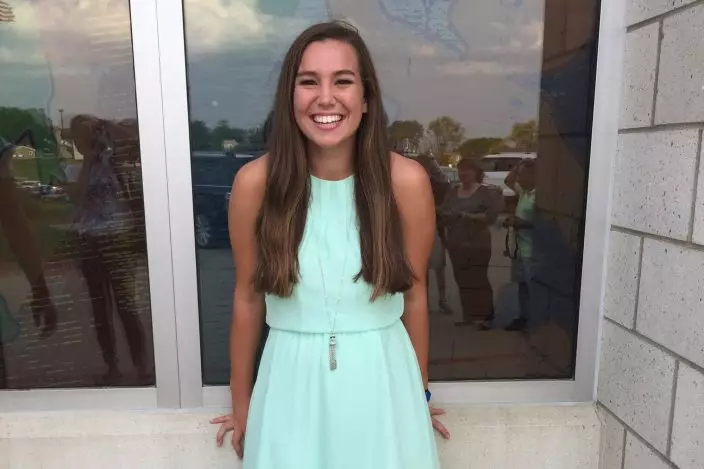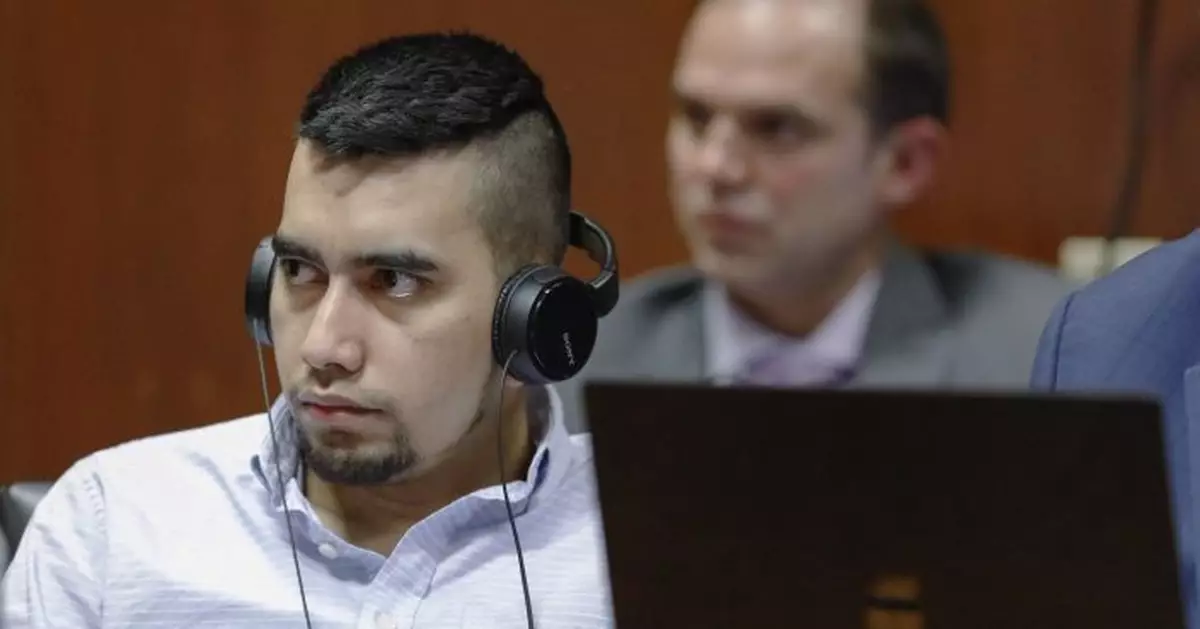A farmworker accused of killing a University of Iowa student in 2018 fell asleep during a lengthy police interrogation, indicating his partial confession may have been coerced while he was sleep deprived, the suspect's defense attorney said Friday.
Cristhian Bahena Rivera, 26, is charged with first-degree murder in the July 2018 stabbing death of 20-year-old Mollie Tibbetts. The partial confession is key to the prosecution’s case.
Videos played in the courtroom in Davenport show Bahena Rivera appearing to sleep for several minutes during the 11-hour interrogation at the Poweshiek County Sheriff’s Office in Montezuma, Iowa, in August 2018.

FILE - In this September 2016 file photo provided by Kim Calderwood, Mollie Tibbetts poses for a picture during homecoming festivities at BGM High School in her hometown of Brooklyn, Iowa. Video evidence, DNA analysis and a partial confession will be critical to proving Cristhian Bahena Rivera, a farm laborer, stabbed Tibbetts, a University of Iowa student, to death while she was out for a run in 2018, a prosecutor told jurors Wednesday, May 19, 2021. (Kim Calderwood via AP, File)
Former Iowa City police officer Pamela Romero, who interrogated Bahena Rivera in Spanish, acknowledged on cross-examination that she noticed he had fallen asleep when she went to get him food. Bahena Rivera had worked a full day at a dairy farm before the police interview began.
Romero recalled Bahena Rivera saying that he was sleepy but she said he remained alert and engaged during the questioning.
Defense attorney Jennifer Frese said the videos showing him sleeping and the harsh interrogation techniques pointed to a potentially coerced confession.
During cross-examination, Romero admitted that she falsely told Bahena Rivera that investigators had found hair in his car and already had his cellphone records.
Romero also admitted that she told Bahena Rivera she was not with immigration enforcement, even though he was later taken into the custody of federal authorities on an immigration detainer halfway through the interrogation. Bahena Rivera arrived in the U.S. from Mexico as a teenager and had been living in the country illegally.
Outside the presence of the jury, prosecutor Scott Brown said the idea that the confession was false and coerced was disproven by evidence showing Bahena Rivera directing police to the location of Tibbetts’ remains. Judge Joel Yates has barred testimony on that after finding that Romero failed to read Bahena Rivera his Miranda rights.
Brown on Friday asked Yates to allow him to use that evidence, saying the defense argument made it relevant. Yates ruled that he would continue to bar that testimony for now.
Investigators say on Aug. 21, 2018, Bahena Rivera led them to the cornfield where Tibbetts’ body had been hidden a month earlier. At the scene, Bahena Rivera said he had approached Tibbetts while she was running, and fought with her after she threatened to call the police, Romero testified.
Bahena Rivera said he blacked out and couldn’t remember how he killed her but that he recalled placing her bloody body underneath corn stalks and leaving, Romero said. Bahena Rivera never gave any indication that he sexually assaulted Tibbetts, she said.
Prosecutors showed jurors several crime scene photos of Tibbetts’ partially naked, decomposing body in the remote cornfield. The first showed Tibbetts' body covered by cornstalks, with only her running shoes sticking out and visible.
Photographs showed her body after the stalks had been removed. Her legs were spread apart and she was wearing only socks and a sports bra. Shorts, underpants and a headband were found further into the cornfield, crime scene technician Amy Johnson testified.
A male and female juror seemed to initially look away from that photo before returning their glances back to the television screens where it was shown.
Judge Joel Yates later seized a camera memory card from a photographer and threatened her with jail after she acknowledged taking photographs of jurors during that testimony, which is prohibited under Iowa court rules.
The photographer — reporting for the Daily Iowan, the student newspaper at the University of Iowa — told Yates that an editor said it was OK to photograph jurors and that she was unaware it wasn't allowed.
She erased the photos in front of the judge, and Yates took possession of the memory card, saying he believed that was sufficient to ensure no photos of the jurors would be disseminated.
Yates said he sent the photographer home and that she would not be further punished, calling her a young person who made a big error. The judge asked other news outlets to not report her name because the misstep could be damaging to her career.


